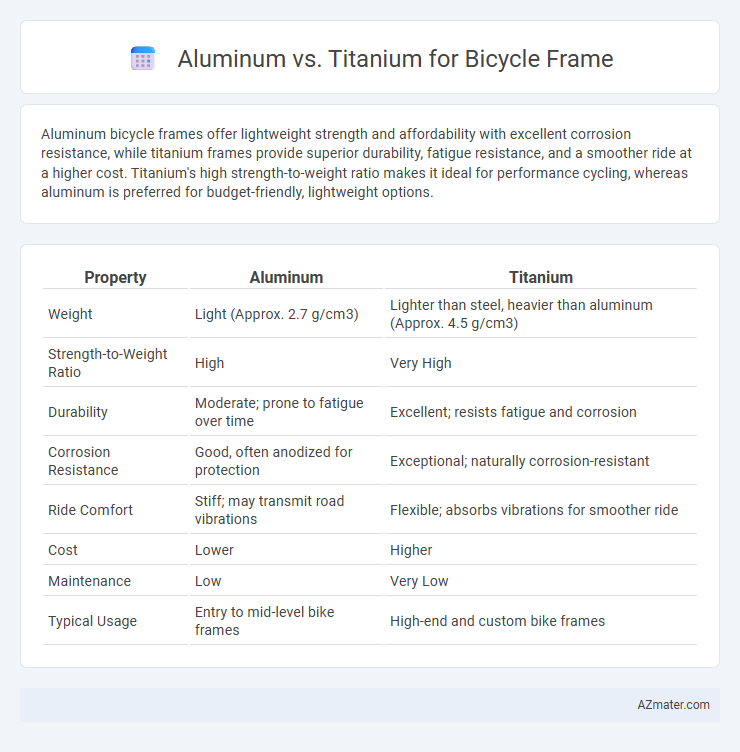Aluminum bicycle frames offer lightweight strength and affordability with excellent corrosion resistance, while titanium frames provide superior durability, fatigue resistance, and a smoother ride at a higher cost. Titanium's high strength-to-weight ratio makes it ideal for performance cycling, whereas aluminum is preferred for budget-friendly, lightweight options.
Table of Comparison
| Property | Aluminum | Titanium |
|---|---|---|
| Weight | Light (Approx. 2.7 g/cm3) | Lighter than steel, heavier than aluminum (Approx. 4.5 g/cm3) |
| Strength-to-Weight Ratio | High | Very High |
| Durability | Moderate; prone to fatigue over time | Excellent; resists fatigue and corrosion |
| Corrosion Resistance | Good, often anodized for protection | Exceptional; naturally corrosion-resistant |
| Ride Comfort | Stiff; may transmit road vibrations | Flexible; absorbs vibrations for smoother ride |
| Cost | Lower | Higher |
| Maintenance | Low | Very Low |
| Typical Usage | Entry to mid-level bike frames | High-end and custom bike frames |
Introduction: Aluminum vs Titanium Bicycle Frames
Aluminum and titanium are two popular materials used in bicycle frames, each offering distinct advantages for riders. Aluminum frames are known for their lightweight properties and affordability, making them a common choice for performance-oriented bikes. Titanium frames provide exceptional strength, durability, and corrosion resistance, appealing to cyclists seeking a balance of comfort and long-term reliability.
Material Properties: Aluminum and Titanium in Cycling
Aluminum bicycle frames are lightweight, offering excellent stiffness and responsiveness, ideal for competitive cycling and quick acceleration. Titanium frames provide superior durability, corrosion resistance, and a smoother ride due to their natural shock absorption, making them preferred for endurance and versatile riding conditions. Both materials balance weight and strength, but aluminum emphasizes performance and affordability while titanium excels in longevity and comfort.
Weight Comparison: Aluminum vs Titanium Frames
Aluminum bicycle frames typically weigh between 1.2 to 1.8 kilograms, making them lighter than most titanium frames, which generally range from 1.5 to 2.2 kilograms. Despite aluminum's lower weight, titanium offers a superior strength-to-weight ratio and enhanced durability, contributing to a slightly heavier frame but increased longevity. Riders seeking lightweight performance often choose aluminum, while those prioritizing ride comfort and frame resilience prefer titanium despite the minor weight increase.
Strength and Durability Factors
Titanium bicycle frames offer superior strength-to-weight ratios, providing excellent fatigue resistance and durability under prolonged stress compared to aluminum. Aluminum frames are generally stiffer and lighter but tend to suffer from metal fatigue faster, leading to a shorter lifespan in high-stress riding conditions. The corrosion resistance of titanium further enhances its durability, making it ideal for long-term use and harsh environments.
Ride Quality and Comfort Differences
Aluminum bicycle frames are lightweight and rigid, offering a responsive ride but often transmitting more road vibrations to the rider, which can reduce comfort on long rides. Titanium frames provide a naturally smooth ride with superior vibration damping, absorbing shocks effectively to enhance comfort without sacrificing strength. The increased compliance of titanium makes it ideal for cyclists seeking a balance between performance and long-distance comfort.
Corrosion Resistance and Longevity
Titanium bicycle frames exhibit superior corrosion resistance compared to aluminum, as titanium forms a stable oxide layer that protects against rust and environmental degradation, extending frame longevity. Aluminum frames, while lightweight and affordable, are prone to corrosion, especially in saltwater or humid conditions, which can reduce structural integrity over time without proper coating. The inherent durability and resistance to fatigue of titanium make it a preferred choice for riders seeking long-term performance and minimal maintenance.
Cost Analysis: Which Frame Offers Better Value?
Aluminum bicycle frames typically cost 20-40% less than titanium frames, making them a budget-friendly option for many cyclists. Although titanium frames have a higher upfront price, they offer greater durability, corrosion resistance, and a longer lifespan, potentially reducing replacement and maintenance costs over time. When balancing purchase price with long-term value, aluminum suits cost-conscious riders, while titanium appeals to those seeking premium performance and longevity.
Maintenance Requirements for Each Material
Aluminum bicycle frames require periodic inspection for corrosion and occasional repainting due to susceptibility to oxidation, especially in humid or salty environments. Titanium frames exhibit exceptional resistance to corrosion and fatigue, drastically reducing maintenance needs and ensuring long-term durability without the need for protective coatings. Both materials benefit from regular cleaning and lubrication of moving parts, but titanium's inherent durability makes it more maintenance-friendly over time.
Best Applications: Road, Mountain, and Touring Bikes
Aluminum bike frames excel in road cycling due to their lightweight and stiffness, providing quick acceleration and efficient power transfer ideal for competitive riding. Titanium frames offer exceptional durability and vibration damping, making them the preferred choice for touring bikes that require long-lasting comfort and resistance to corrosion. Mountain bikers benefit from aluminum's impact resistance and affordability, though titanium frames are favored for premium off-road models offering enhanced fatigue resistance and a smoother ride over rough terrain.
Conclusion: Choosing the Right Frame for Your Cycling Needs
Aluminum frames offer a lightweight and affordable option with excellent stiffness and responsive handling, ideal for competitive cyclists seeking performance on a budget. Titanium frames provide superior durability, corrosion resistance, and a smoother ride, making them perfect for long-distance touring or riders prioritizing comfort and longevity. Selecting between aluminum and titanium depends on balancing performance needs, budget constraints, and intended use, ensuring the frame complements your cycling goals.

Infographic: Aluminum vs Titanium for Bicycle Frame
 azmater.com
azmater.com